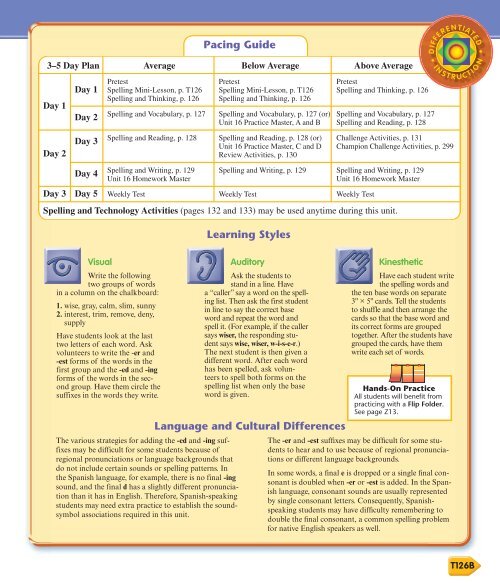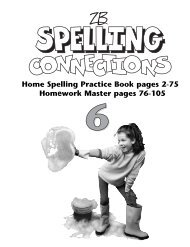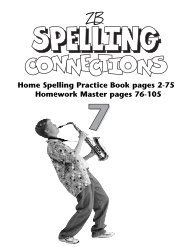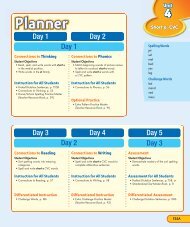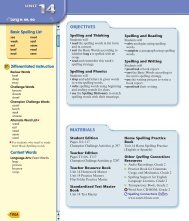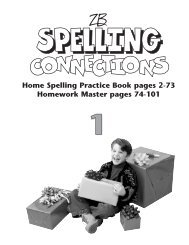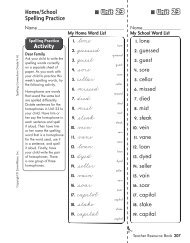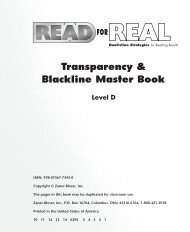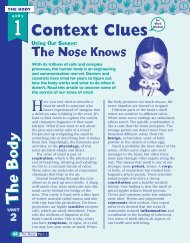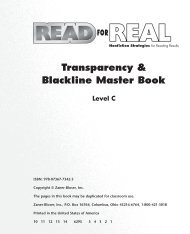Spelling Connections - Zaner-Bloser
Spelling Connections - Zaner-Bloser
Spelling Connections - Zaner-Bloser
You also want an ePaper? Increase the reach of your titles
YUMPU automatically turns print PDFs into web optimized ePapers that Google loves.
Visual<br />
Write the following<br />
two groups of words<br />
in a column on the chalkboard:<br />
1. wise, gray, calm, slim, sunny<br />
2. interest, trim, remove, deny,<br />
supply<br />
Have students look at the last<br />
two letters of each word. Ask<br />
volunteers to write the -er and<br />
-est forms of the words in the<br />
first group and the -ed and -ing<br />
forms of the words in the second<br />
group. Have them circle the<br />
suffixes in the words they write.<br />
Pacing Guide<br />
3–5 Day Plan Average Below Average Above Average<br />
Pretest Pretest Pretest<br />
Day 1 <strong>Spelling</strong> Mini-Lesson, p. T126 <strong>Spelling</strong> Mini-Lesson, p. T126 <strong>Spelling</strong> and Thinking, p. 126<br />
<strong>Spelling</strong> and Thinking, p. 126 <strong>Spelling</strong> and Thinking, p. 126<br />
Day 1<br />
Day 2<br />
<strong>Spelling</strong> and Vocabulary, p. 127 <strong>Spelling</strong> and Vocabulary, p. 127 (or) <strong>Spelling</strong> and Vocabulary, p. 127<br />
Unit 16 Practice Master, A and B <strong>Spelling</strong> and Reading, p. 128<br />
Day 3<br />
<strong>Spelling</strong> and Reading, p. 128 <strong>Spelling</strong> and Reading, p. 128 (or) Challenge Activities, p. 131<br />
Unit 16 Practice Master, C and D Champion Challenge Activities, p. 299<br />
Day 2 Review Activities, p. 130<br />
Day 4 <strong>Spelling</strong> and Writing, p. 129 <strong>Spelling</strong> and Writing, p. 129 <strong>Spelling</strong> and Writing, p. 129<br />
Unit 16 Homework Master Unit 16 Homework Master<br />
Day 3 Day 5 Weekly Test Weekly Test Weekly Test<br />
<strong>Spelling</strong> and Technology Activities (pages 132 and 133) may be used anytime during this unit.<br />
The various strategies for adding the -ed and -ing suffixes<br />
may be difficult for some students because of<br />
regional pronunciations or language backgrounds that<br />
do not include certain sounds or spelling patterns. In<br />
the Spanish language, for example, there is no final -ing<br />
sound, and the final d has a slightly different pronunciation<br />
than it has in English. Therefore, Spanish-speaking<br />
students may need extra practice to establish the soundsymbol<br />
associations required in this unit.<br />
Learning Styles<br />
Auditory<br />
Ask the students to<br />
stand in a line. Have<br />
a “caller” say a word on the spelling<br />
list. Then ask the first student<br />
in line to say the correct base<br />
word and repeat the word and<br />
spell it. (For example, if the caller<br />
says wiser, the responding student<br />
says wise, wiser, w-i-s-e-r.)<br />
The next student is then given a<br />
different word. After each word<br />
has been spelled, ask volunteers<br />
to spell both forms on the<br />
spelling list when only the base<br />
word is given.<br />
Language and Cultural Differences<br />
Kinesthetic<br />
Have each student write<br />
the spelling words and<br />
the ten base words on separate<br />
3" × 5" cards. Tell the students<br />
to shuffle and then arrange the<br />
cards so that the base word and<br />
its correct forms are grouped<br />
together. After the students have<br />
grouped the cards, have them<br />
write each set of words.<br />
Hands-On Practice<br />
All students will benefit from<br />
practicing with a Flip Folder.<br />
See page Z13.<br />
The -er and -est suffi xes may be diffi cult for some students<br />
to hear and to use because of regional pronunciations<br />
or different language backgrounds.<br />
In some words, a fi nal e is dropped or a single fi nal consonant<br />
is doubled when -er or -est is added. In the Spanish<br />
language, consonant sounds are usually represented<br />
by single consonant letters. Consequently, Spanishspeaking<br />
students may have diffi culty remembering to<br />
double the fi nal consonant, a common spelling problem<br />
for native English speakers as well.<br />
DI FFE R E NTIATE D<br />
O N<br />
I N S T R U C T I<br />
T126B


